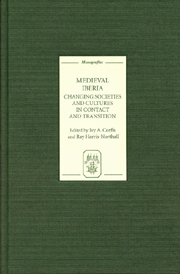Book contents
- Frontmatter
- Contents
- Acknowledgements
- Introduction
- Part 1 SOCIAL AND CULTURAL MINORITIES IN CHANGING SOCIETIES
- Part 2 CONTACT AND CONFLICT: PERSPECTIVES ON HISTORY AND CULTURE
- Part 3 TRANSMISSION OF LEARNING AND TEXTS IN CHANGING CULTURES
- Part 4 LINGUISTIC CONTACT AND CHANGE
- Perils of Speaking of Orígenes de la lengua
- Aspects of Official Language Usage in Castile and León: Latin and the Vernacular in the Early Thirteenth Century
- Considering Paradigmatic Factors in the Reduction of Old Spanish sodes > sois
- Index
Aspects of Official Language Usage in Castile and León: Latin and the Vernacular in the Early Thirteenth Century
from Part 4 - LINGUISTIC CONTACT AND CHANGE
Published online by Cambridge University Press: 12 September 2012
- Frontmatter
- Contents
- Acknowledgements
- Introduction
- Part 1 SOCIAL AND CULTURAL MINORITIES IN CHANGING SOCIETIES
- Part 2 CONTACT AND CONFLICT: PERSPECTIVES ON HISTORY AND CULTURE
- Part 3 TRANSMISSION OF LEARNING AND TEXTS IN CHANGING CULTURES
- Part 4 LINGUISTIC CONTACT AND CHANGE
- Perils of Speaking of Orígenes de la lengua
- Aspects of Official Language Usage in Castile and León: Latin and the Vernacular in the Early Thirteenth Century
- Considering Paradigmatic Factors in the Reduction of Old Spanish sodes > sois
- Index
Summary
In a number of ways the sociopolitical situation of the Iberian Peninsula during the medieval period was unique in Europe, and the thirteenth century was, within that period, a time of important changes. In Castile and León, either as separate states or, after 1230, definitively united as a single kingdom, many of these changes were directly or indirectly related to the military advances of the Christian armies in the Islamic south. Though the ongoing military campaigns were by this time limited geographically to the south of the Peninsula, their effects resounded throughout the kingdom in terms of demographic shift, economic policy and commerce. And it is probably not coincidental that in the midst of this social ebullience, the cultural life of the Christian kingdoms also came to the forefront.
The political administration had to keep up with these changes in order to deal with the complexities of maintaining armies in the south, repopulating areas which had been taken militarily and providing government in reconquered territory; this in addition to all its other tasks. This administration, in Iberia just as in other areas of Western Europe, had always been carried out officially in Latin, both when it involved official communication between the king and his subjects and when one state communicated with another. It used to be taken without question that Latin was perceived at the time much in the same way as it is to modern Spanish speakers now: as a non-native, that is, foreign language; it took some training after all to develop any literate ability in Latin.
- Type
- Chapter
- Information
- Medieval IberiaChanging Societies and Cultures in Contact and Transition, pp. 165 - 174Publisher: Boydell & BrewerPrint publication year: 2007

